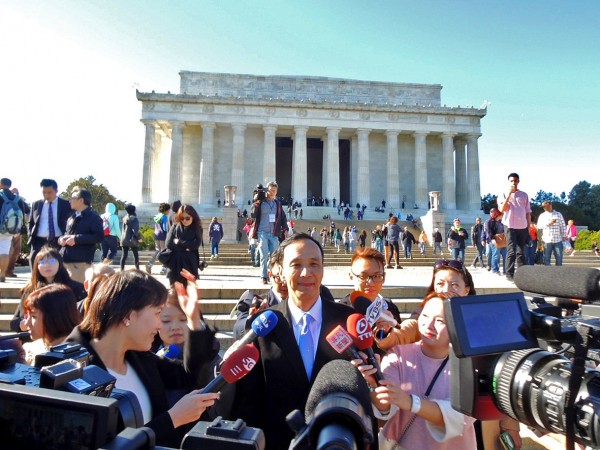《TAIPEI TIMES 焦點》 Chu and Tsai ‘given same’ US treatment

Chinese Nationalist Party (KMT) presidential candidate Eric Chu, center, talks to reporters on the steps of the Lincoln Memorial in Washington on Friday. Photo: Shih Hsiao-kuang, Taipei Times
‘NO FAVORITES’: US Assistant Secretary of State for East Asia Daniel Russel said that discussions during recent visits by Taiwan’s presidential candidates focused on policy
By William Lowther / Staff reporter in Washington
Senior US officials on Friday said that Chinese Nationalist Party (KMT) presidential candidate Eric Chu (朱立倫) and Democratic Progressive Party (DPP) presidential candidate Tsai Ing-wen (蔡英文) had been given exactly the same reception in Washington.
“We do not play favorites,” Assistant Secretary of State for East Asia Daniel Russel said.
Russell was addressing a Foreign Press Center briefing on US President Barack Obama’s upcoming trip to the G20 summit in Turkey, as well as Malaysia and the Philippines.
Speaking as Chu ended his two-day visit to Washington, Russel was adamant that the two Taiwanese presidential candidates were treated equally.
Russel said that conversations he had with Chu during his visit had focused on policy.
“We have an open door to major political actors on Taiwan and want to underscore that contrary to speculation in the Taiwan press, the entry for both representatives from the KMT and the DPP was of equal access with even-handed treatment,” he said.
He said that the US did not back political parties, but that it did care about policies.
“These visits have created an opportunity for us to consult, confer and discuss policy issues with the head of the KMT and DPP,” Russel said.
He said that the US has strong unofficial ties with Taiwan based on “our deep respect for Taiwan’s democracy” and on the US’ interest and stake in Taiwan’s security.
Russel said the focus of conversation with both candidates was in the context of the “one China” policy, and how stability across the Taiwan Strait could be maintained and tensions reduced.
National Security Council Senior Director for Asian Affairs Daniel Kritenbrink, supporting everything that Russel had said, added that Washington welcomed the recent meeting between President Ma Ying-jeou (馬英九) and Chinese President Xi Jinping (習近平).
“We also welcome the historic improvement we have seen in cross-strait relations over the last several years,” he said.
Kritenbrink said the US has a deep and abiding interest in peace and stability in the Taiwan Strait and that was the focus of its interest. He said the US supported the building of ties between China and Taiwan to reduce tensions and increase stability “on the basis of dignity and respect.”
Kritenbrink said that the US welcomed the further development of cross-strait relations and would maintain its “one China” policy based on the three communiques and the Taiwan Relations Act.
Asked if the US was “surprised” by the Ma-Xi meeting, he refused to comment, except to say the US welcomed steps that promoted cross-strait relations in a manner that was acceptable to both sides of the Strait.
On Chu, Kritenbrink said: “We welcomed Chairman Chu’s visit and our conversations with him were productive. We received Chairman Chu in exactly the same way that we received presidential candidate Tsai Ing-wen. We met both candidates at exactly the same level.”
Before leaving Washington for New York and San Francisco, Chu met with think tank experts at the Brookings Institution and with the editorial board of the Washington Post.
Before entering the closed-door Brookings meeting, Chu spoke briefly to Taiwanese reporters and criticized the DPP.
“Has the DPP finally turned a new page in its dealing with mainland China?” he asked. “My answer is ‘hardly.’”
He said there was a major difference between the DPP’s treatment of cross-strait relations and the KMT’s.
“The DPP engages in wishful thinking vis-a-vis cross-strait relations — the DPP offers a policy goal of maintaining the ‘status quo’ which people agree upon, but the DPP shirks the responsibility of providing a workable formula to achieve that goal,” he said.
Chu said Ma had done an “excellent job” in designing policy that helped maintain the “status quo,” but had neglected one aspect of the “complicated and complex” nature of cross-strait relations.
“If elected president, I will make up for what he left out — cultivating a domestic base for a grand strategy that can secure peace,” he said.
新聞來源:TAIPEI TIMES















